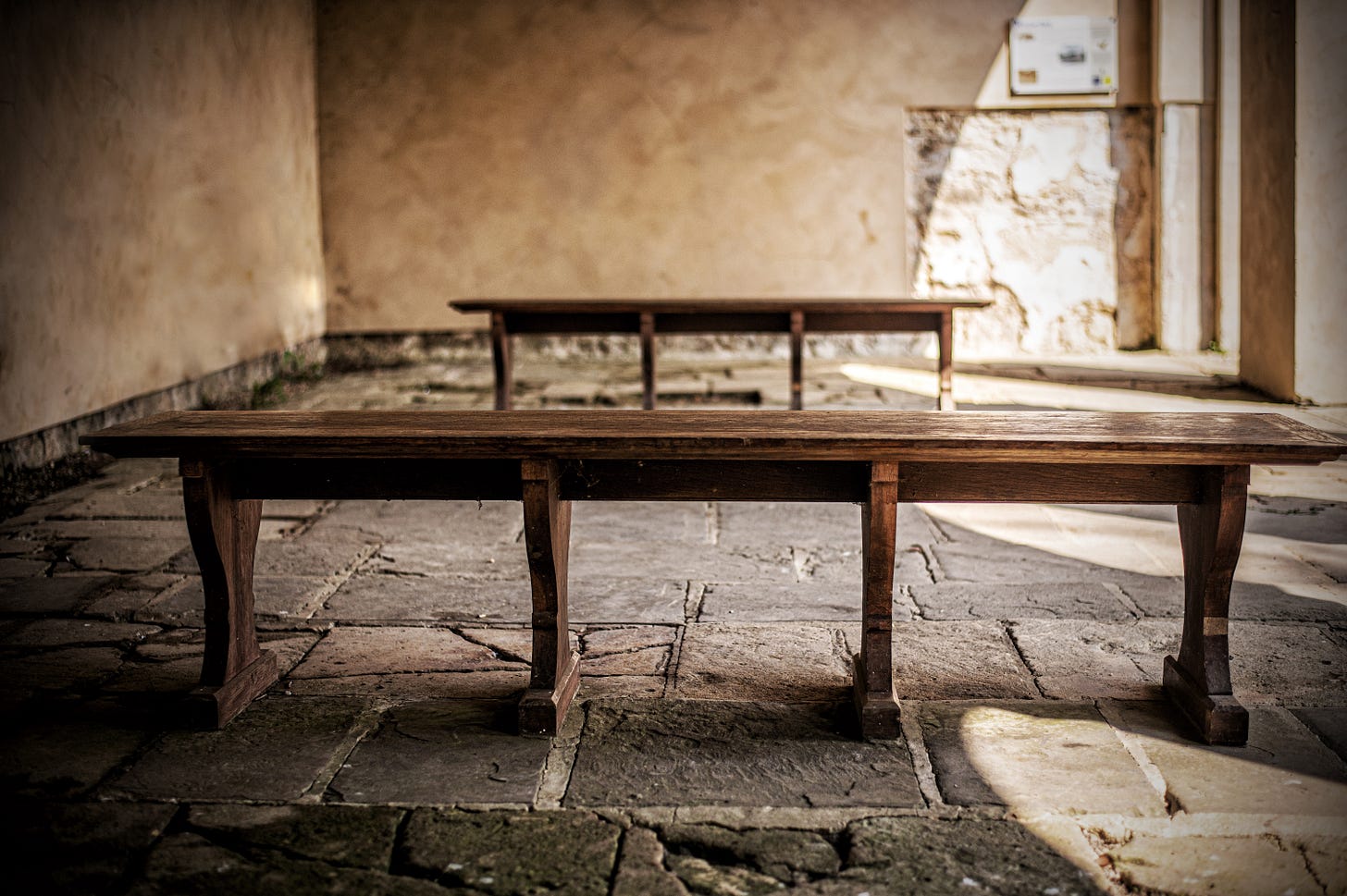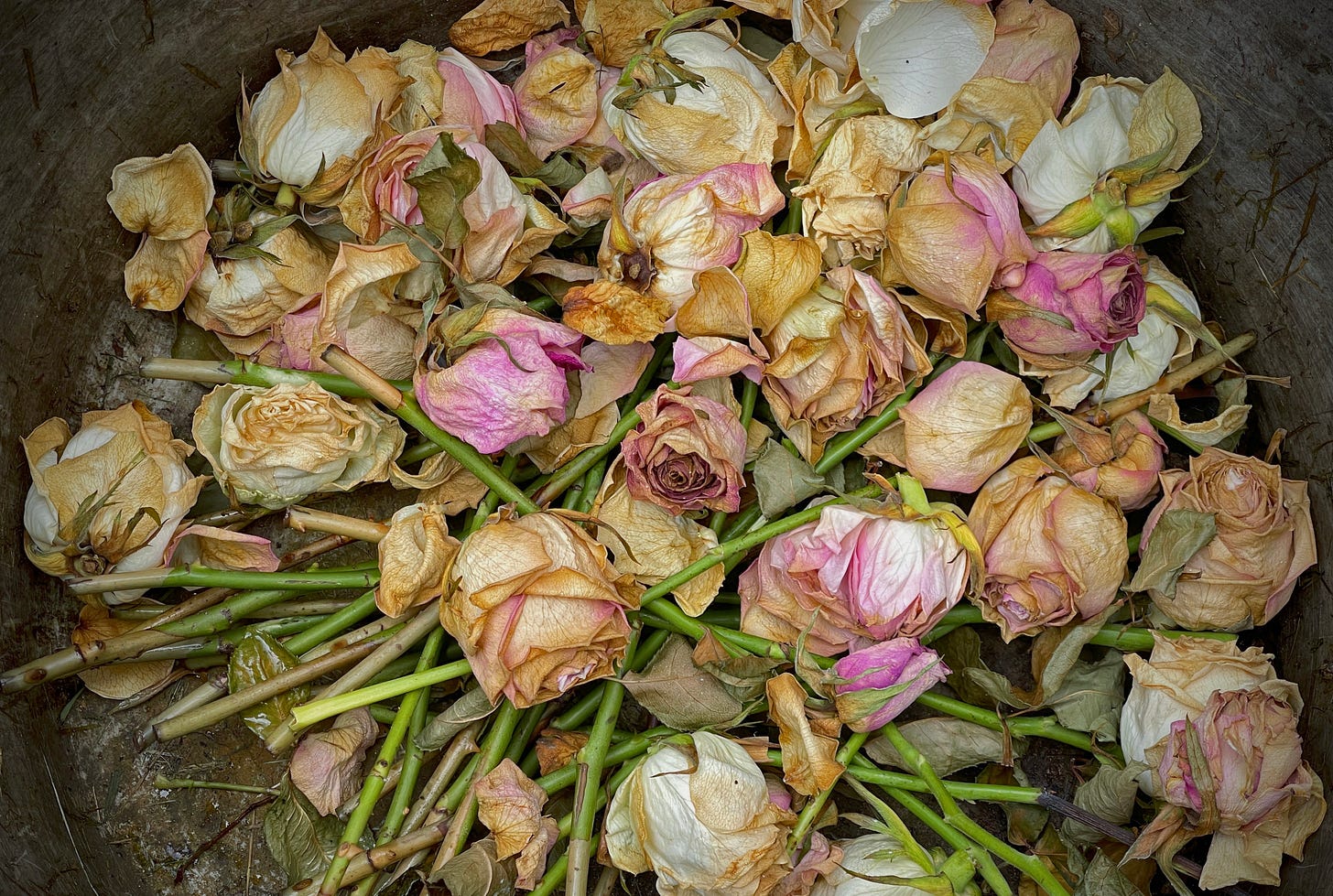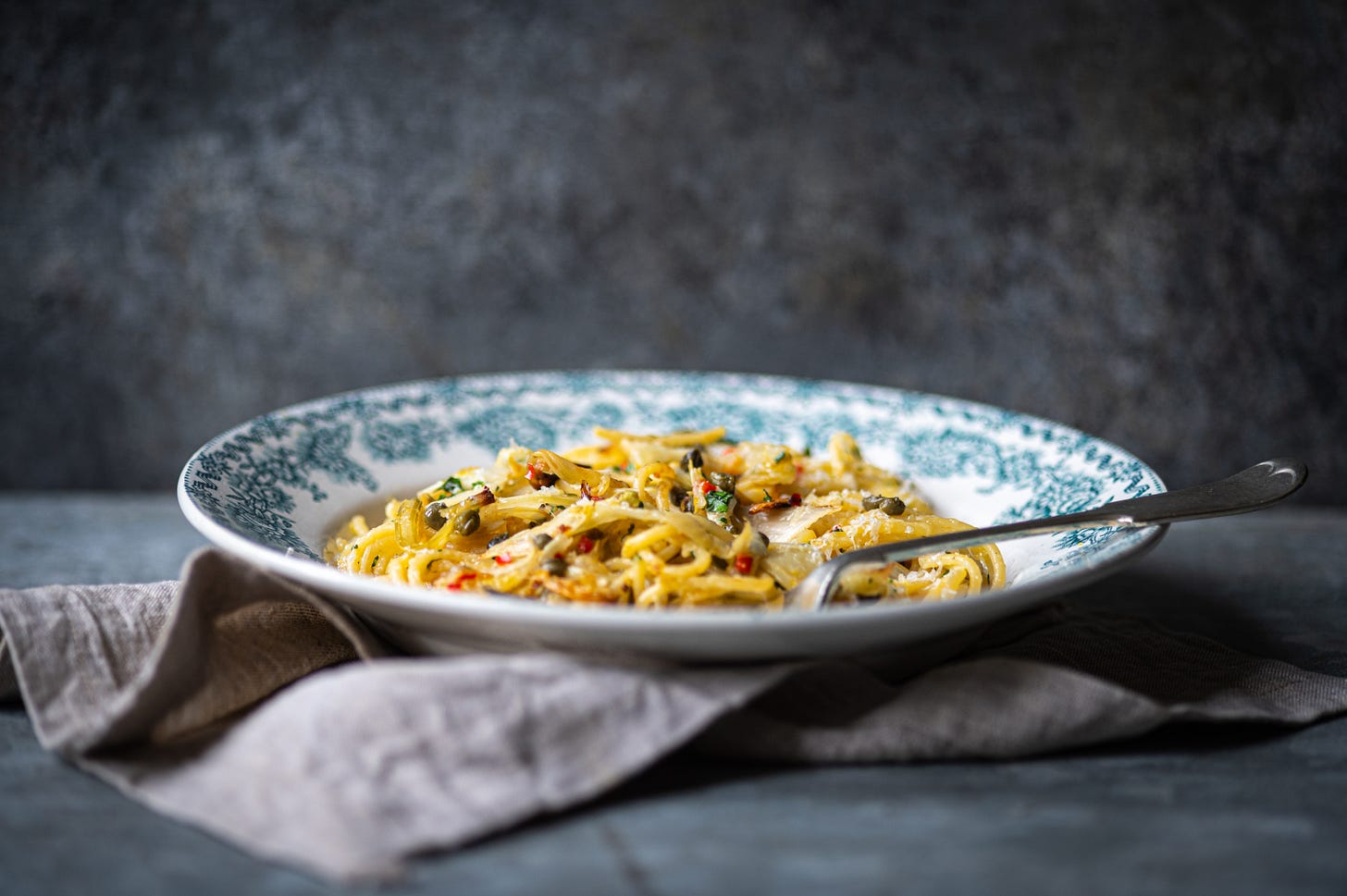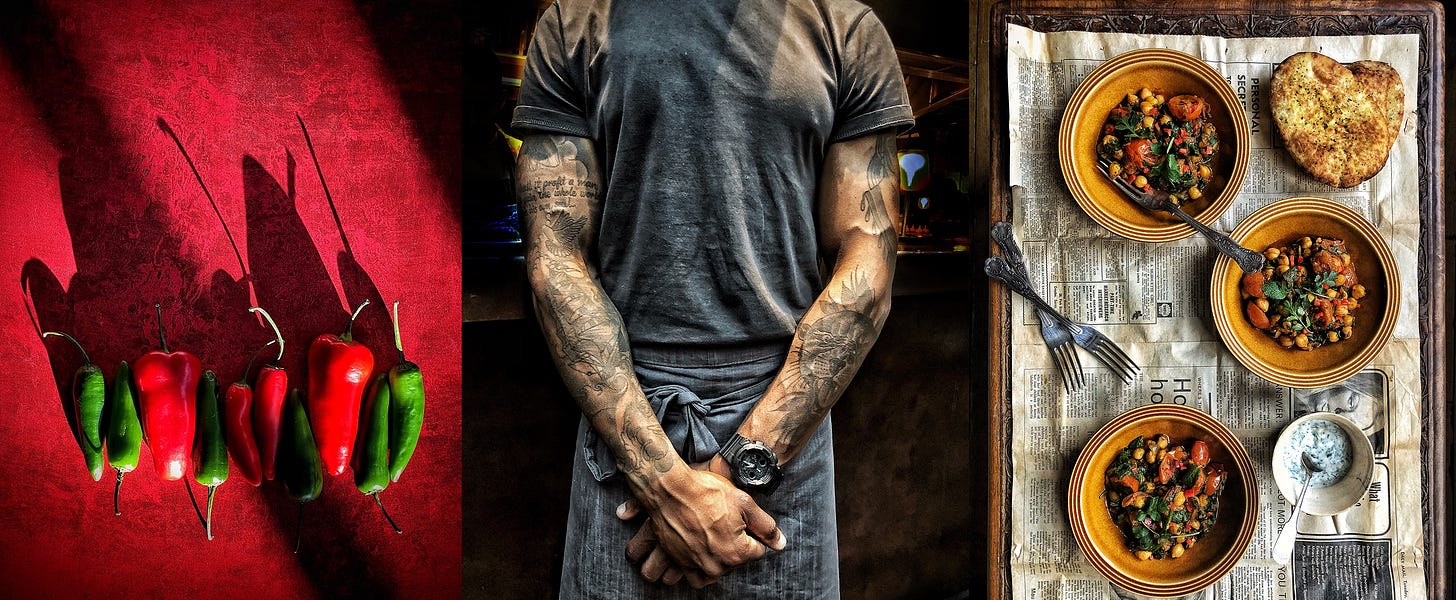Understanding backwards, something of value, a chipped plate
#5 | May 2023
Understanding backwards
There is a famous quote from Kierkegaard that resurfaced recently via the newsletter of
regarding how it is not possible to immerse oneself within life and understand it at the same time:‘It is really true what philosophy tells us, that life must be understood backwards. But with this, one forgets the second proposition, that it must be lived forwards.’
To this philosophical insight, I would add that much of what we truly understand of life is understood at distance, often one far removed from events gone by – once those events have been questioned, thought and felt about many times. Yesterday’s difficulty might be something we cannot make sense of today, and perhaps not the next day, next week or next month. When it is understood, it might take months or years to find agreement in our understanding with one another. Many of us look for this certainty – the comfort of accord, a consistency in the alignment of our beliefs. But to attain certainty with any sort of integrity – that is to say a certainty built around an honest evaluation of our principles – requires effort and time spent understanding. Daily, in our political discourse, we witness a certainty of belief yet do not often sense the work of understanding. We are asked to believe and accept the certainty of others without a requirement to understand. Indeed, many in power hope that we won’t make this effort to understand. The poet and essayist Paul Valery told us that, ‘politics is the art of preventing people from taking part in affairs which properly concern them’.
We are each of us guilty of defining people by one idea or a belief in one single thing. At a time when we have never had greater access to the media and its multiple free-to-use and free-to-participate platforms, we are simultaneously deprived of rigorous but well-intentioned debate and nuance – things which can guide us around the complexity of the political choices that we must make. Simplistic gets mistaken for that which is simple. Our broadcast media, which is so often attacked for its lack of impartiality, and which so often sets everything as dichotomously for or against, left or right, rarely ever affords us the thorough, compassionate and courteous cross-examination of and between the people who can influence change.
There is a quite famous informal debate from 1971 between Jonathan Miller and Enoch Powell when both were guests on The Dick Cavett Show. Now more than half a century old, it resurfaced towards the end of last year after this country’s Home Secretary reached once again for petrol and lit match when discussing immigration, an issue which her government and this country’s media have made increasingly combustible. Abhorrent though Powell’s words and ideas are, the conversation he shares with Miller is one which no politician would subject themselves to today. Our democracy is much poorer for the loss of measured interlocution between two people of opposing thought, however much we might fear the ventilation of ideas that one finds repugnant.
I formed an idea of these thoughts while reading about the recent proposal to extend the right to vote in England to sixteen-year-olds. I considered that my seventeen-year-old daughter’s mind is one that is open; her father’s, I am sure, is a mind more closed. That mind of hers is one that is ready to enquire, and with a desire to understand. She seems aware of the world around her; and sensitive to the life within it. To return to the quote of the Danish philosopher with which this essay began, she almost makes me believe that it is possible to live and understand the world in which one lives simultaneously – such is the energy and confidence of the young. I hope she never once arrives at a certainty in her beliefs without first putting in the effort to understand.
Something of value
I’ve been working my way through the books of Virginia Woolf over the last couple of months, having not previously read any of her work. It’s her essay work that appealed to me the most, not least since reading her very short essay, ‘The Death of the Moth’. A Room Of One’s Own, her seminal work in the essay form, is quite brilliant. I jotted down a few lines of note as I went through and particularly loved this: ‘I do not believe that gifts, whether of mind or character, can be weighed like sugar and butter…’ On a similar note, bouncing around my head from the previous day, was a quote from Arthur Miller: ‘Don’t be seduced into thinking that that which does not make profit is without value.’ It occurred to me that one must also not be seduced into accepting that any real value lies within everything which makes profit. How we measure such things (profit/wealth/value/worth) is a subject which has long fascinated/tortured me. Sometimes, we fail to recognise where the real value, worth and beauty of something lies, something which came to mind again just yesterday when disposing of week-old flowers to a bucket of garden detritus. I realised that they wore a very different beauty to the one they displayed in their vase; free from containment, their splendour pricked so much more sharply.
A chipped plate
The recipe I like best from the cookbook I enjoy most is spaghetti with roasted fennel, lemon and chilli. The Eagle Cookbook was first published as Big Flavours, Rough Edges which was a phrase coined by Fay Maschler, and one that it’s hard to improve upon when describing the recipes that the Eagle, the grandaddy of gastropubs, would become and remain famous for. The dish itself is those flavours mentioned above mixed with capers and parsley, all of which gets steam-roasted in a shallow bath of olive oil. The cooked spaghetti gets added to the roasting tin and a shaming amount of Parmesan cheese gets showered over the top (shaming only in that these days you’ll be poorer by about two quid if you choose to do this dish full justice). I have so many fond memories of working on the reissue of the Eagle book, almost 15 years ago. The Farringdon-based pub had been an institution for over a decade, founded by restaurant manager Mike Belben and head chef David Eyre. The original book went out of print and so the publisher I worked for acquired the rights and we set about giving the pub and the public back a book in its own name. I art-directed and designed, and was proud to take a very young and gifted new photographer, Lara Holmes, under my wing. She shot the book over a few days, capturing many of the Eagle’s classic Mediterranean-inspired dishes and something of its charming life and character. David was the first head chef, but only two more have succeeded him in the thirty years of the pub being open, with many more brilliant chefs joining alongside: an alumni that would represent some of the most formative and influential names of the last twenty years of the British restaurant scene. Mike was famed for assembling huge stacks of vintage crockery from his weekend car boot trawls. He’d also be the one with hammer and wood glue fixing a broken spindle on one of the dining room’s mismatched chairs or slipping a coaster underneath the too-short leg of the table in the corner near the window. Mike’s never changed, and it’s never changed – the dishes are still packed with big flavours, served rough at the edges: my favourite kind of food. You’ll also probably be able to spy a copy of the original kitchen copy of their cookbook, held together by cooking grease and a spine of gaffer tape. And you’ll almost certainly receive the occasional Pappa al Pomodoro or slice of Basque Cheesecake on the cracked glaze of a car-boot chipped Spode plate: a flaw of perfectly forgivable prosaic charm. It always feels the right way to eat these dishes at home, too.
Recommended other fragments…
Just read: Small Things Like These, Claire Keegan
The story of a coal and timber merchant with a difficult past, set in a mid-eighties Irish town that holds onto its secrets. It’s hard to imagine a bigger story packed into a smaller number of pages. This novella comes in smaller than many a short story, but Keegan doesn’t waste a single word. Her economy is masterful and impressive, but her story is utterly absorbing and moving.
Now reading: Maggie & Me, Damian Barr
Staying in the eighties, this engrossing memoir is about growing up gay in the straight and masculine streets and schools of Glasgow, as Thatcher (the titular ‘Maggie’ of the title) was breaking up the unions and pushing her neoliberalist agenda. Barr writes quite beautifully and tells his story at pace and with great humour and nostalgia. He also has – so far, at least – more sympathy/hope for what Maggie might do than all of the men and women he is growing up around, in the dying industrials town and cities of Scotland and the north.
Podcast/Broadcast: A Phone Call From Paul, Paul Holdengräber
I discovered this podcast series a couple of months ago. For much of the time since it has been the only podcast I’ve listened to and I’ve now ploughed through the entirety of its eighty-eight episode run (two dog walks a day provides me with plenty of listening time). Holdengräber is the former director of the New York Public Library’s list of public programming. His interview subjects include the likes of John Berger, Margaret Atwood and Salman Rushdie. A self-confessed ‘quotomaniac’, his vast knowledge seems to encompass the whole artistic output of every one of his many varied interviewees. With reference to that which he doesn’t know, he’s fond of repeating, ‘I leave holes in my culture in order for it to breathe’. The series is a trove of fascinating insights into the arts, every bit as interesting for discovering people you don’t know as it is for those you do.
Music: Music Has The Right To Children, Boards Of Canada
A few weeks back marked the 25th anniversary of this seminal album of electronic music. Back in 1998, it sounded like nothing I’d ever heard before… it still sounds that way. I remember listening to the album on the recommendation of the in-house DJ at the original and just opened Urban Outfitters store in Kensington High Street (that same DJ also persuaded me to listen to and leave with Autechre’s Incunabula, so to him I remain doubly grateful). Out of synch with any particular time, it is curiously both modern sounding and nostalgic. Its soothing, melancholy, shuffling melodies are broken up by beats that spit and kick amidst a mesh of sampled analogue sounds. Should you enjoy this album, their follow-up four-track EP, In A Beautiful Place Out In The Country, was BOC at their very, very best.
People: Hanif Kureishi
For those of you who have been on Substack for a while, you might have come across the weekly chronicles of writer
Forthcoming events…
On Monday 29th May, I’ll be publishing the first edition of a new subscription newsletter titled ‘Pictures and Words About Food’. Within it, I’ll be sharing tips and advice from twenty-five years of working creatively with food, both as a food photographer and within the industry of food publishing. For those of you who have joined me on one of my phone photography workshops over the last six years, there will be teachings and ideas you will be familiar with, which I will be sharing and developing within this newsletter format. Instagram will feature too. I’ll also be offering ideas on book publishing, having spent the greater part of my creative life working across all aspects of the publishing process. I’ll be touching on all of these aspects, from design and art direction through to the commissioning process, self-publishing, editing, writing, photography, even print and production. If you’re an aspiring writer, I hope there will be much that will inspire and inform. If you’re a published writer, hopefully something that you will recognise and enjoy reading about.
Who will this spin-off newsletter appeal to? Anyone with an interest in the creative world around food and food publishing, whether you’re an aspiring writer, photographer or food producer keen to visually share your passion with an online audience. Perhaps you enjoy taking images with your phone camera, or are a fan of food books and food writing. If you’ve previously joined me for one of my phone photography workshops or wish to grow your online social media following, then you’ll discover lots of ideas that will help to improve what you publish.
Will I have to pay for this newsletter? ‘A Thousand Fragments’ will remain my free monthly newsletter to all, with various thoughts about the world we live in, the culture I’ve been consuming and a dash of food memoir. The first edition of ‘Pictures and Words About Food’ will be sent to all subscribers, but guaranteed future editions will only be available to paying subscribers. There will be two editions each month and you can subscribe for £3.99 per month or for £39.99 per year.
What sort of content will be included? I’ll take a different theme each letter. There will be tips, lots of tips, and practical advice that will help you to plan, style and create better food photos. Advice that will help you to think clearly about your ideas around food writing. Occasional interviews with photographers and writers from within the industry. Demonstration videos and step-by-step visuals that will take you through my workflow. Case studies of books I’ve worked on, clients I’ve worked with and projects I’ve helped bring to fruition. I’ll mix it up, but keep each letter to the subject of creating around food and aim to instruct and inspire as I go. As a subscriber, you’ll also receive first news and discounts to any future workshops and events that I run.
What next then? If you wish to receive this free newsletter then stay subscribed. If you would like to dip into the ‘Pictures and Words About Food’ spin-off, then switch to a paid subscription and I hope you’ll find enough with each new edition to stay subscribed and support the writing and materials I’ll be creating and sharing. You can unsubscribe at any point you like (and without me taking any offence whatsoever).
I’d love you to give it a try and let me know if there is anything you would like to see me write about.





I often feel this way about flowers, hence why I either have festering vases of half fallen petals or dried bunches hung on each wall gathering dust and happiness!
Another rewarding read Matt. Thank you.